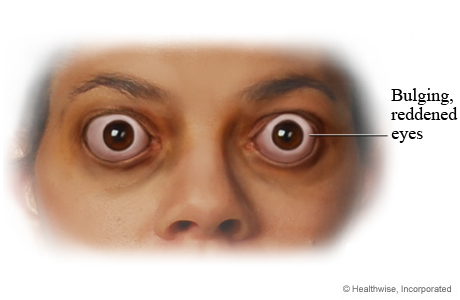
Overview
Graves' disease causes problems in the thyroid gland, which controls your metabolism. Sometimes it can also cause eye problems. This is called thyroid eye disease or Graves' ophthalmopathy. The tissues and muscles that surround your eye become swollen. This can cause your eye to move forward and bulge out. This can happen before, after, or at the same time as other signs of hyperthyroidism.
If you have thyroid eye disease you may have double vision. You may have swelling, pressure, or pain around the eyes. The skin around the eyes may look loose and baggy. You may also have dry or teary eyes, irritated eyes, redness, or problems closing your eyelids.
To treat Graves' disease, your doctor will make sure your thyroid level is normal. Your eye doctor will treat your eye symptoms or problems with your vision. The treatment will depend on how severe your symptoms are.
Artificial tears may be used to treat mild symptoms. If you have double vision, your eye doctor may recommend special lenses to help your vision. If you have swelling around the eyes, you may get a steroid medicine. It can help reduce the swelling. Or the doctor may talk to you about radiation or surgery for more serious eye problems. Radiation or surgery may help to treat problems in the muscles and tissues around your eyeball.
Follow-up care is a key part of your treatment and safety. Be sure to make and go to all appointments, and call your doctor if you are having problems. It's also a good idea to know your test results and keep a list of the medicines you take.
How can you care for yourself at home?
- Be safe with medicines. Take your medicines exactly as prescribed. Call your doctor if you think you are having a problem with your medicine.
- To put in eyedrops or ointment:
- Tilt your head back, and pull your lower eyelid down with one finger.
- Drop or squirt the medicine inside the lower lid.
- Close your eye for 30 to 60 seconds to let the drops or ointment move around.
- Don't touch the ointment or dropper tip to your eyelashes or any other surface.
- Do not smoke. Smoking can make thyroid eye disease worse. If you need help quitting, talk to your doctor about stop-smoking programs and medicines. These can increase your chances of quitting for good.
- If your eyes are dry, you can try artificial tears. You can buy these without a prescription.
- If your eyes are sensitive to light, cold, or wind, you can try wearing dark glasses. This can help protect your eyes.
When should you call for help?
Watch closely for changes in your health, and be sure to contact your doctor if:
- You have new or worse eye pain.
- You have new or worse redness in your eye.
- You have vision changes.
- You do not get better as expected.
Where can you learn more?
Go to http://www.healthwise.net/patientEd
Enter T446 in the search box to learn more about "Thyroid Eye Disease: Care Instructions".
Current as of: July 31, 2024
Author: Ignite Healthwise, LLC Staff
Clinical Review Board
All Healthwise education is reviewed by a team that includes physicians, nurses, advanced practitioners, registered dieticians, and other healthcare professionals.

